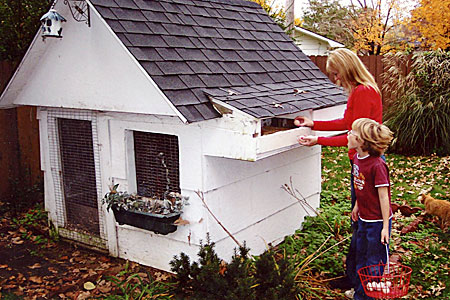
As exciting as it is to get new chicks in spring, even more exciting is finding their first eggs in the fall. As your pullets grow, you’ll naturally wonder when to expect your chickens to starting laying eggs. The answer depends on their state of health, their diet, their breed, and their age.
Health
A chicken has enough energy to either lay eggs or defend itself against disease, but not both. Therefore, a hen that’s dealing with health issues must struggle to lay eggs. Two of the most common health issues of young chickens are coccidiosis and worms. Luckily, both problems are easy to avoid with good management. For more info see:
Coccidiosis — the Scourge of Chicks and Poults
Do Your Chickens Need Deworming?
Diet
Nutritional needs change as egg laying breeds grow from chicks into hens. So what you feed your pullets (female chicks) affects their future egg production. And once they mature into laying hens, their dietary needs continue to change with their level of production and with the season. For more info see:
Feed Options — What Do Chickens Eat?
Breed and Age
Chicken breeds that are known for high egg production may start laying soon after they reach four months of age. But most backyard breeds start laying at the age of about 5 months. Slow maturing breeds, on the other hand, may not lay until the age of 8 months, or even later. Learn more here:
At What Age Do Hens Start Laying Eggs?
How to Tell Eggs Are Coming Soon
A hen that’s about to start laying eggs will be nearly full size for her breed. Her plumage will be smooth and shiny. Her comb will grow from small and pink to large and red. She may become more talkative.
The hen will peer into dark corners looking for potential nesting sites. She may even spend time in a nest, as if to find out how it feels.
Because she wants her eggs to be fertile, so they can hatch into chicks, when a rooster approaches she’ll squat to be mated. She may even squat for other hens or for her human keeper.
When she finally lays her first egg, it’s likely to be quite small and may contain no yolk. Or it may have an odd shape or a soft, rubbery shell. These oddities just mean the hen’s reproductive system isn’t yet fully developed.
Don’t worry. Within a couple of weeks she should be regularly laying eggs of normal size, shape, and color for her breed.
And that’s today’s news from the Cackle Coop.
Gail Damerow is the author of Storey’s Guide to Raising Chickens.


The Cackle buff Brahmas that hatched on 7/8/24 have laid 2 eggs starting in mid September! (aprox. 2 1/2 months old)
Has anyone else had this happen?
Absolutely no way any other birds got in their enclosure. (They are still kept strictly inside in their own pen inside our barn). Our other adult hens have floor to ceiling mesh so there is no way they got into that space.
They get Kalmbach Feeds All-Natural Non-GMO 18% Protein Start Right Chick Feed-and are growing like weeds! (chicks i ordered in this batch 6+1 buff brahma hens and 2 roosters, 2 light brahma roosters, and buff silkies).